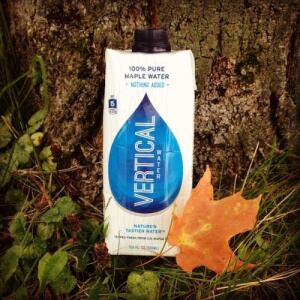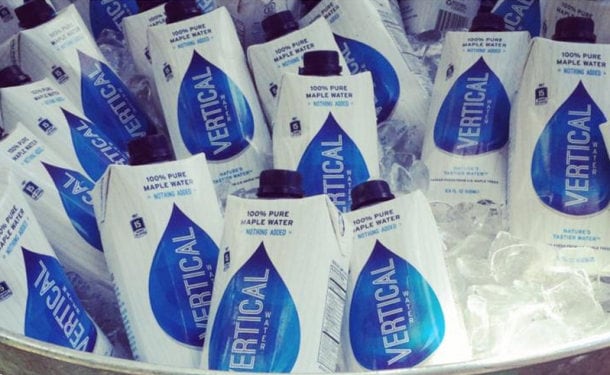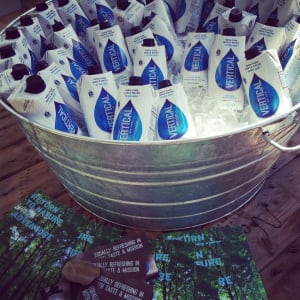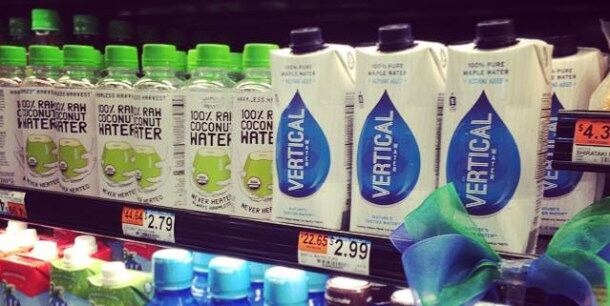It's lower in sugar and calories than coconut water (a 240ml serving of Vertical Water has 15 calories, and 3g of naturally occurring sugar, vs c.45 calories and up to 11g sugar for coconut water), and collecting it does not harm the environment, Cugnasca tells FoodNavigator-USA.
“We’re actually helping to conserve American forests. The water comes from the earth, through the roots, and vertically through the trunk and branches, and is constantly replaced. It’s not like human blood; you can keep tapping it without hurting the tree.”
And finally, while maple water contains many nutrients from the soil (notably manganese - it has 40% of the RDA), it's not going to turn you into an Olympic athlete, she says - for the benefit of those who have googled ‘maple water benefits’ and come across those sniffy ‘there’s not much science behind it… you’d be better off drinking water’ type articles...
We’re not marketing it as a magical elixir
While these negative sentiments have arguably been prompted by some overzealous marketing by rivals, they are frustrating nonetheless, says Cugnasca, given that she is “not marketing Vertical Water as a magical elixir” or making any health claims about it.
If you like the taste of plain water, that’s great, she says. But if you don’t, Vertical Water is a refreshing and delicious alternative. “Once people taste it, they’re hooked.”
Sometimes it’s wonderful just to have something that’s natural and delicious and is not bad for you
Consumers, she says, buy Vertical Water for the taste, but also because it's a simple, natural product that's made in America from trees grown in New York State (unlike coconut water, which is being shipped over to the US from overseas).
“There is pressure to turn it into some kind of perfect ‘functional’ drink, but I think it’s pretty darn perfect already.

“Sometimes it’s wonderful just to have something that’s natural and delicious and is not bad for you,” adds Cugnasca, a New York-based former corporate finance expert who strayed into the beverage industry almost by accident as she was exploring ways to transform a timberland investment fund called Feronia Forests into a model for sustainable forestry.
Call it tree-hugging capitalism
Today, Vertical Water, which she set up with her father Paolo (who founded risk management firm Emcor Securities), is just one of several revenue-generating initiatives emerging from Feronia Forests, including an aerial adventure park called Ramblewild, and renewable energy projects (solar and wind).
“Call it tree-hugging capitalism," she says. "But you can get value out of a forest without just cutting down the trees. We are passionate about our mission to keep trees vertical, one sip at a time. It is not an afterthought, not a reason to use 'sustainable' in marketing materials, but the entire reason for the creation of Vertical Water."
Vertical Water is now in more than 1,100 stores nationwide
But will shoppers cough up $2.99 for a 16.9oz carton of plant water - albeit a very tasty one - that doesn’t make any hardcore health claims?
The evidence to date suggests the answer is a resounding yes, says Cugnasca, who test-marketed the product (in mason jars) in 2012, launched it in Tetra Paks in an 8-week trial in 10 Sprouts stores in late 2013, expanded to all Sprouts (170+) stores in April 2014, and is now in more than 1,100 stores nationwide, from Whole Foods and Kroger to Wegmans.
Other firms are also getting in on the action, from Seva and DrinkMaple to Maple3, Oviva and Halo Beverages (bettersweet), although most are still at a fairly early stage.
"We imagine there will be more in 2015... all with the same end goal: to get maple sap/water, the amazing natural springtime tonic from maple trees, to the consumer. And to that end, the players have to work together."

Call it tree-hugging capitalism
But what will distinguish the winners from the losers?
Companies that have spent as much time building a scalable business model as well as a brand will probably have the edge, predicts Cugnasca, who spent a long time before the commercial launch of Vertical Water working out exactly how the business might respond if consumers embrace maple water as enthusiastically as they have coconut water.
At the most basic level, the infrastructure is there, in that there’s no shortage of maple trees, says Cugnasca: “Less than 2% of maple trees in New York State are tapped for maple water (to make maple syrup).”
The challenge is that there is a narrow window of opportunity both to collect the water (typically between January to April), and to get it from the tree to a packing facility at a low temperature before it starts to degrade (which happens in a matter of days), she adds.
"Each manufacturer’s inventory is limited by the amount of sap collected during the season. Having a good sales & distribution plan in place for 2014 prepared Vertical Water so that we could answer yes or no to any major retailer based on whether or not the call would be strategically correct for the brand, and not be forced into an inventory-based decision."
Scalability may prove to be a challenge for some companies
As for tapping the water, for 2014, Vertical Water sourced its sap from established sap producers in Western New York State who collect sap for maple syrup manufacturing, but as it expands, the strategy is to bring in new producers, she adds.

“People say, well I’ve got four trees in my backyard. That’s great but it doesn’t make sense to send a big truck to pick up the water just from four trees. But if three or four people in the same area also have trees, things start to change.”
She adds: "Scalability may prove to be a challenge for some companies. The category is so new it is difficult to forecast on many levels; once on solid ground, so to speak, each producer will have to carve out target consumer markets and niches to develop its brand."
As for the pasteurization process, she says: “We looked at a lot of different preservation methods from HPP to a retort process, but we settled on a UHT process before the product is packed in TetaPaks - which gives it a 14-month shelf-life."
Sugar and mineral content can vary between maple water brands
As for the Nutrition Facts panel, there are differences between the maple waters currently on the market, chiefly because it's a natural product, she says.
So sugar content can vary depending on when the sap is collected, and the location of the trees, while nutrient content will also vary depending on the soil from which the maple trees draw their water.
"Some regions are known to have a higher calcium content, while others have higher potassium or manganese."

It’s a marathon, not a sprint
Given the success of Vertical Water to date, Cugnasca is quietly confident that the brand - and the maple water category as a whole - is here to stay. But it’s a marathon, not a sprint, she says, when asked the inevitable, 'Is maple water the next coconut water?' question.
“We don’t want to over-reach ourselves. Yes coconut water is now worth hundreds of millions of dollars, but it didn’t get there overnight.”
